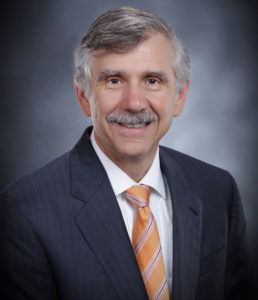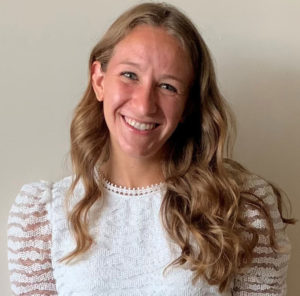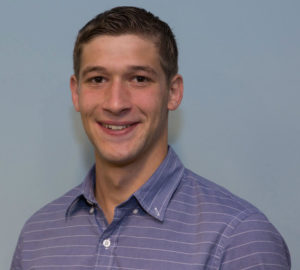Dave Duryea ’83: ‘Start building and using your network’
Dave Duryea ’83: ‘Start building and using your network’
A career Navy officer and dedicated alumnus helps students be all they can be

Dave Duryea ’83
Retired Rear Admiral David Duryea ’83 spent 31 years in the U.S. Navy, having received his commission through the University of Rochester’s NROTC program. Duryea served the Navy as a combat systems officer, a force engineer, and the commanding officer for the USS Florida. Later in his career, he served as the Commander of the Naval Undersea Warfare Center in Newport, RI, which employed 6,500 civilians around the U.S. and overseas.
After retiring from the Navy, Duryea spent about three years at SUNY Cortland as vice president for finance and management. In 2018, Duryea joined Systems Planning and Analysis (SPA) Inc.—a national security consulting firm based in Alexandria, Virginia—where he manages a team that supports national security objectives focusing on Naval and undersea warfare.
“At SPA, we employ people with expertise in project management, systems engineering, data science, operations research as well as strategy and policy,” says Duryea, who is also a member of the University’s Veterans Alliance. “These are the kinds of skills that help the federal government—including the Department of Defense and the Department of Homeland Security—solve hard problems.”
In his spare time, Duryea helps University of Rochester students—many of whom are majoring in areas important to SPA—get a jump start on their careers. He is aware of many federal government related career opportunities which Rochester students might not be familiar with. And, he knows that Rochester educates and graduates the kinds of students who would excel in these roles.
That’s why he reached out to Rochester and the Greene Center for Career Education & Connections a few years ago. “SPA hires 12–15 paid interns every year, mostly undergraduates, but also a few graduate students,” he says. “We are very selective, but when we find the right fit, we offer security clearances and provide our interns with great opportunities to learn, grow, and contribute. In exchange, they help us do our work and learn valuable skills. Everyone wins.”

Sara Apanavicius ’20
Sara Apanavicius ’20, a chemical engineering major, was one of those students. During her junior year, she realized graduation was approaching and she hadn’t had—and really wanted—an internship. Apanavicius knew of Duryea through a friend of hers who had met him through The Meliora Collective—an innovative online platform that empowers members of the University community to pursue their professional passions through personal exploration. She then reached out directly to him.
“Dave read my resume and said that if SPA didn’t have any opportunities that he’d connect me with some of his other contacts in D.C.,” says Apanavicius. “I couldn’t believe that someone I didn’t really know would be so willing to help.” That connection helped Apanavicius land an internship at SPA during the summer between her junior and senior years.
At the end of that internship, SPA offered Apanavicius a job as a technical program analyst after graduation. She’s been there since July of 2020 and loves it. She’s now even getting calls and emails from Rochester students looking to her for career guidance.
“Dave’s been a great mentor to me,” she says. “He’s helped me prepare for interviews, consider different job opportunities, and think about what’s important to me—I had no idea that my first conversation with him would lead to where I am today.”

Cole Sonett ’19
Cole Sonett ’19, a mechanical engineering major, feels the same way—he and Duryea are currently part of The Meliora Collective mentorship program. This program brings together enthusiastic alumni and students to help prepare mentees for their professional futures. Mentors provide real-world context, personal insights, and ongoing support to help mentees achieve short and long-term personal and career goals.
“I signed up for the mentorship match program because I wanted to talk with someone impartial who works in a field related to my interests,” says Sonnet, who currently works as a project manager for climate intelligence startup, Setpoint.ai, in Brooklyn. His goal is to someday start his own company. “I really needed an experienced person to bounce ideas off of, provide me with fresh perspective, and help me figure out the next steps to work toward my career goals—Dave has been so helpful.”
Duryea knows how important networking is. “I’m not a hiring manager, but if I can point students and young people in the right direction at SPA or elsewhere, I’m happy to do so,” he says. “So much is up to the students, though—fortunately, Rochester attracts and graduates people who will make a real difference in the world.”
“Alumni Relations and the Greene Center offer so many career resources,” says Joe Testani, assistant dean and executive director of the Greene Center. “In addition to The Meliora Collective and the mentorship match program, they offer a variety of virtual events, an alumni online business directory, career coaching, career webinars, recruitment support, and much more. We encourage our broad community to get involved—doing so could help advance your career or someone else’s.”
Career building tips
Dave Duryea offers the following advice to students—relevant during the pandemic and beyond:
Seek out hands-on experiences. “Experience is valuable,” he says. “Take on an internship and pursue research opportunities—they will mark your life and set you apart.” Duryea vividly recalls some of his experiences at Rochester. For instance, the ROTC program taught him about leadership, teamwork, and discipline. He honed those skills on the squash court, too, as a member of Rochester’s team for four years and captain for two. Duryea also participated in memorable research experiences, including one professor-led program in Canada that involved sleeping in a rustic cabin over fall break and conducting research including water analysis tests on a local lake. Another research experience took him to St. Croix for a semester to scuba dive, study marine biology, and learn about marine geology and ecology.
Remember that people want to help. “People generally like to help each other out. Don’t be afraid to start building and then using your network.” He adds that the only way students will learn is by doing, so students should talk to their parents’ friends, alumni, whomever could open doors to them. He recommends using The Meliora Collective, signing up for LinkedIn, and then reaching out to people. “The worst thing that could happen is that someone doesn’t respond,” he says. “The best thing is that a connection could lead to an opportunity.”
Be open to new ideas—or as the Navy says, “always be courageous.” One friend of Duryea’s was an investigator for the Environmental Protection Agency. She led scientific teams and helped clean up toxic waste sites. The intelligence community, which is comprised of 16 agencies, is another area that needs people with diverse skill sets. No matter what your major is, Duryea suggests looking into opportunities with the federal government. Here are some places to start:
USAJOBS, www.intelligencecareers.gov, the Association of Former Intelligence Officers, and other federal agency websites.
Together for Rochester is a yearlong campaign designed to make life better. Get involved by helping our career centers to open doors for students—recruit Rochester graduates, offer internships, full-time jobs, post-graduate fellowships, and career-building volunteer activities.
— Kristine Thompson, April 2021


